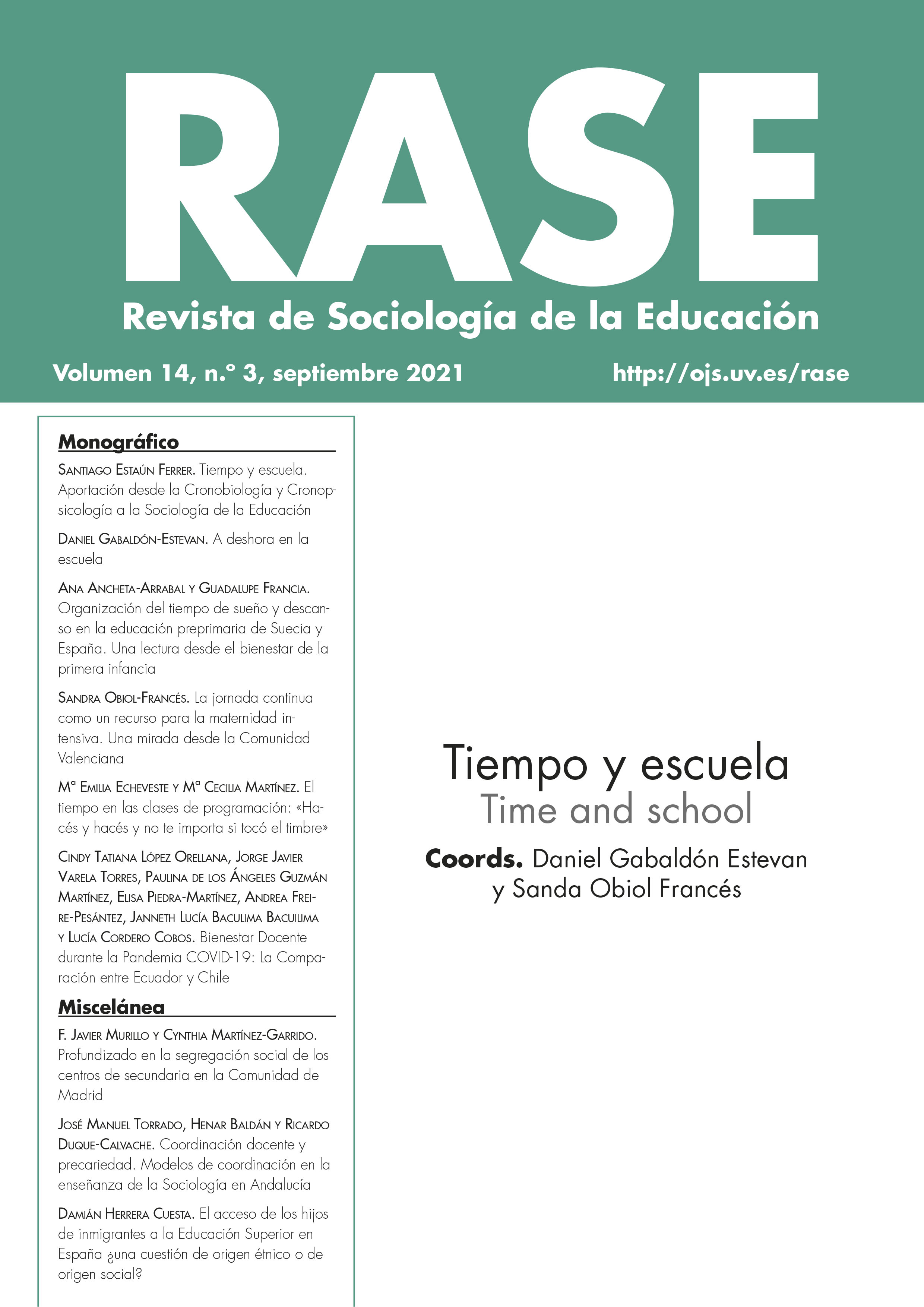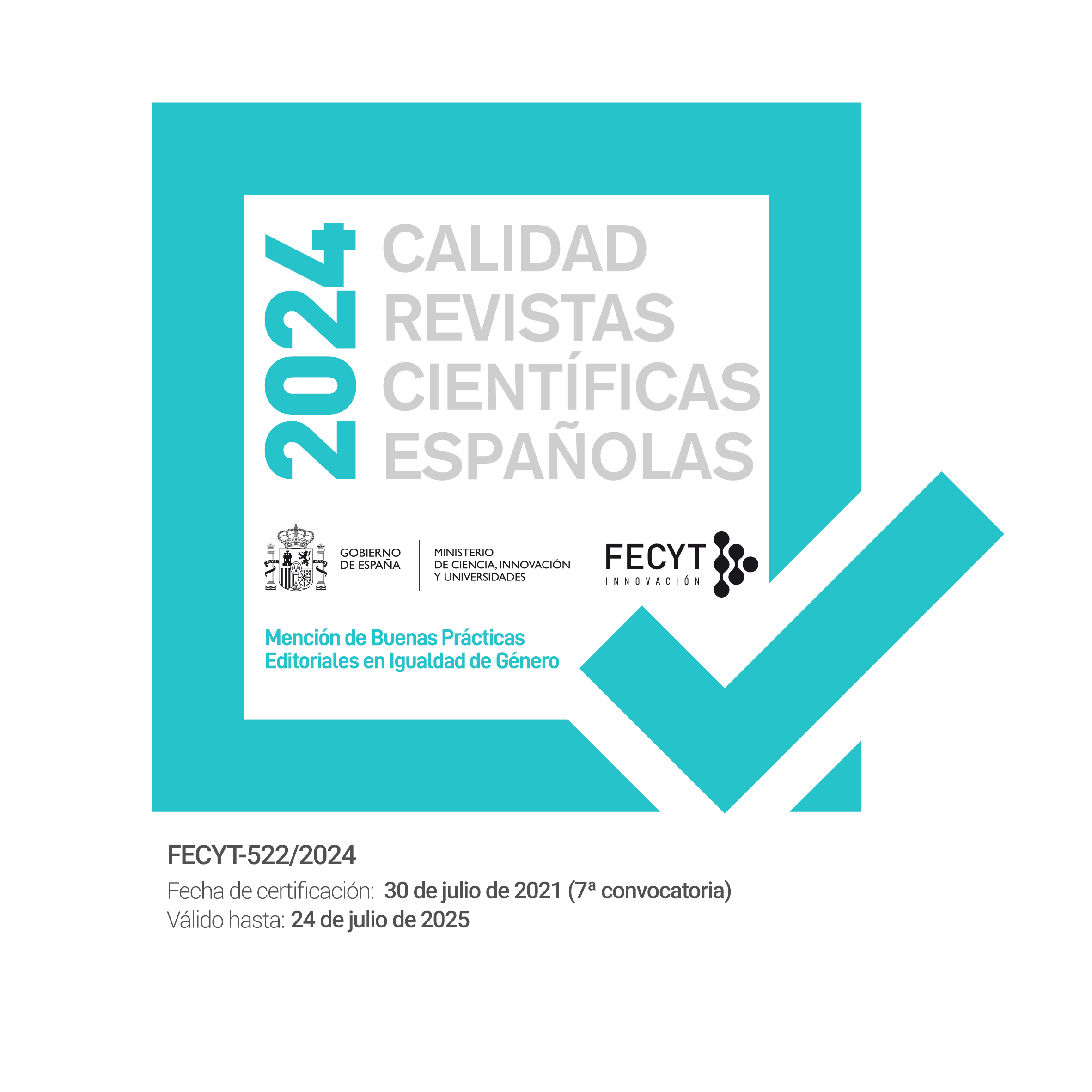Bienestar Docente durante la Pandemia COVID-19: La Comparación entre Ecuador y Chile.
DOI:
https://doi.org/10.7203/RASE.14.3.21472Palavras-chave:
Bienestar, Emociones, Desgaste, Ciberacoso, Pandemia, Docentes Resumo
Resumo
El quehacer docente se ha visto afectado a causa de la crisis sanitaria a nivel mundial, los docentes han debido transformar la forma de hacer su trabajo y enfrentar nuevos desafíos profesionales. El objetivo de este estudio es identificar y comparar entre docentes chilenos y ecuatorianos percepciones de bienestar emocional, social y laboral durante la pandemia; también identificar diferencias por género y la relación entre el nivel de bienestar y diferentes dimensiones socioemocionales. Participaron 881 docentes de preescolar, primaria y secundaria de ambos países, quienes respondieron un cuestionario en línea sobre carga laboral/doméstica, horario laboral, apoyo institucional, afectos positivos y negativos, apoyo social, desgaste emocional, bienestar y ciberacoso. Los resultados reportan mayor carga laboral y doméstica durante la pandemia, también se evidencian puntuaciones con tendencia positiva en todas las dimensiones socioemocionales, sin embargo los docentes ecuatorianos de forma significativa han percibido menos carga laboral, doméstica y desgaste, mayor bienestar general, sentimientos positivos y apoyo, lo que indica que características sociodemográficas influyen en la forma de afrontar situaciones de crisis. Otra variable de influencia fue el género, en donde las mujeres han percibido una mayor carga a nivel emocional, social y laboral. Se evidencia correlación positiva alta entre bienestar general con sentimientos positivos y apoyo social; correlaciones negativas altas entre bienestar general con sentimientos negativos y desgaste emocional. En conclusión, estos resultados revelan la realidad socioemocional que están viviendo los docentes durante la pandemia y da pautas para generar acciones que promuevan el bienestar general de esta población.
 Downloads
Downloads
 Referências
Referências
Akin, U., Aydin, I., Erdogan, C., & Demirkasimoglu, N. (2014). Emotional labor and burnout among Turkish primary school teachers. Australian Educational Researcher, 41, 155–169. https://doi.org/10.1007/s13384- 013-0138-4
Alcalá, V., Camacho, M., Giner, D., Giner, J., & Ibáñez, E. (2006). Afectos y género. Psicothema, 18( 1), 143-148. https://reunido.uniovi.es/index.php/PST/article/view/8409
Alves, R., Lopes, T., & Precioso, J. (2021). Teachers' well-being in times of Covid-19 pandemic: factors that explain professional well-being. IJERI: International Journal of Educational Research and Innovation, 15, 203-217. https://doi.org/10.46661/ijeri.5120
Cáceres, V., Gill, N., & Galeano, M. (2020). Incertidumbre docente por pandemia COVID-19. Academic Disclosure, 1(1), 96-108.
Calderón-Guevara, C., Racines-Cabrera, M., Castañeda-Lasso, G., & Rodríguez-Arboleda, F. (2021). Análisis de las condiciones laborales del magisterio ecuatoriano durante la pandemia. Ciencia Latina Revista Científica Multidisciplinar, 5(1), 734-759. http://www.dspace.uce.edu.ec/handle/25000/22611
Calvo, S. T., Cervi, L., Tusa, F., & Parola, A. (2020). Educación en tiempos de pandemia: reflexiones de alumnos y profesores sobre la enseñanza virtual universitaria en España, Italia y Ecuador. Revista Latina de Comunicación Social, (78), 1-21. https://dialnet.unirioja.es/servlet/articulo?codigo=7625686
Canet-Juric, L. (2020, Noviembre 16-17). Seguimiento longitudinal del impacto de la pandemia sobre la salud mental de los argentinos[Conferencia]. La Plata. https://digital.cic.gba.gob.ar/handle/11746/10760
Cárdenas Castro, M., Barrientos Delgado, J., & Ricci Alvarado, E. (2015). Estructura factorial de la escala de soporte social subjetivo: validación en una muestra de estudiantes universitarios chilenos. Acta Colombiana de Psicología, 18(1), 95-101.https://doi: 10.14718/ACP.2015.18.1.9
Cenkseven-Önder, F., & Sari, M. (2009). The quality of school life and burnout as predictors of subjective well-being among teachers. Kuram ve Uygulamada Egitim Bilimleri, 9(3), 1223–1236. https://files.eric.ed.gov/fulltext/EJ858924.pdf
CEPAL-UNESCO (2020). La educación en tiempos de la pandemia de COVID-19.https://repositorio.cepal.org/handle/11362/45904
Chaplin, T. M. (2015). Gender and emotion expression: A developmental contextual perspective. Emotion Review, 7(1), 14-21. https://doi.org/10.1177/1754073914544408
Chen, H., Liu, F., Pang, L., Liu, F., Fang, T., Wen, Y., . . . Gu, X. (2020). Are you tired of working amid the pandemic? The role of professional identity and job satisfaction against job burnout. International Journal of Environmental Research and Public Health, 1-14. https://doi:10.3390/ijerph17249188
Chopik, W. J., O’Brien, E., & Konrath, S. H. (2017). Differences in empathic concern and perspective taking across 63 countries. Journal of Cross-Cultural Psychology, 48(1), 23-38.https://doi.org/10.1177/0022022116673910
Corcoran, R. P., Cheung, A. C. K., Kim, E., & Xie, C. (2018). Effective universal school-based social and emotional programs for improving academic achievement: A systematic review and meta-analysis of 50 years of research. Educational Research Review, 25, 56–72. https://doi.org/10.1016/j.edurev.2017.12.001">https://doi.org/10.1016/j.edurev.2017.12.001
Daniel, S. J. (2020) Education and the COVID-19 pandemic. Prospects 49, 91–96https://doi.org/10.1007/s11125-020-09464-3
di Fronso, S., Costa, S., Montesano, C., Di Gruttola, F., Ciofi, E. G., Morgilli, L., Robazza, C., & Bertollo, M. (2020). The effects of COVID-19 pandemic on perceived stress and psychobiosocial states in Italian athletes. International Journal of Sport and Exercise Psychology, 1-13. https://doi.org/10.1080/1612197X.2020.1802612
Diener, E., & Lucas, R. E. (1999). Personality and subjective well-being. In D. Kahneman, E.Diener, & N. Schwartz (Eds.), Well-being: The foundations of hedonic psychology (pp.213-229). Russell Sage.
Feeney, B. C., & Collins, N. L. (2015). Thriving through relationships. Current Opinion in Psychology, 1, 22–28. https://doi.org/10.1016/j.copsyc.2014.11.001">https://doi.org/10.1016/j.copsyc.2014.11.001
García-Planas, M. I., & Taberna, J. T. (2021). Transición de la docencia presencial a la no presencial en la UPC durante la pandemia del COVID-19. IJERI: International Journal of Educational Research and Innovation, (15), 177-187.
Gil-Monte, P. R. (2011). CESQT. Cuestionario para la Evaluación Del Síndrome de Quemarse por el Trabajo [SBI. Spanish Burnout Inventory].TEA.
Goleman, D. (1998). La práctica de la inteligencia emocional. (1a ed). Kairós.
Gorichon, S., Salas, M., Araos, M. J., Yáñez, M., Rojas-Murphy, A., & Jara-Chandía, G. (2020). Prácticas de mentoría para la inducción de docentes principiantes: análisis de cuatro casos chilenos al inicio del proceso. Calidad en la Educación, (52), 12-48. http://dx.doi.org/10.31619/caledu.n52.824
Grandey, A. A. (2000). Emotional regulation in the workplace: A new way to conceptualize emotional labor. Journal of Occupational Health Psychology, 5(1), 95–110. http://doi: 10.1037//1076-8998.5.1.95
Hagenauer, G., & Volet, S. E. (2014). Teacher–student relationship at university: an important yet under-researched field. Oxford Review of Education, 40(3), 370–388. http://doi:10.1080/03054985.2014.921613
Hargreaves, A. (1998). The emotional politics of teaching and teacher development: With impli- cations for educational leadership. International Journal of Leadership in Education, 1, 315–336. https://doi.org/10.1016/S0742-051X(98)00025-0
Hargreaves, A. (2000). Mixed emotions: Teachers’ perceptions of their interactions with students. Teaching and teacher education, 16, 811–826https://doi.org/10.1016/S0742-051X(00)00028-7">. https://doi.org/10.1016/S0742-051X(00)00028-7
Hervás, G., & Vázquez, C. (2013). Construction and validation of a measure of integrative well-being in seven languages: The Pemberton Happiness Index. Health and quality of life outcomes, 11(1), 1-13. https://doi.org/10.1186/1477-7525-11-66
Hué García, C. (2012). Bienestar docente y pensamiento emocional. Revista Fuentes, 12, 47-68.
Jiménez-Yañez, C. (2020). Chiledespertó: causas del estallido social en Chile. Revista mexicana de sociología, 82(4), 949-957.https://doi.org/10.22201/iis.01882503p.2020.4.59213
Jorquera Gutiérrez, R., & Herrera Gallardo, F. (2020). Salud mental en funcionarios de una universidad chilena: desafíos en el contexto de la COVID-19. Revista Digital de Investigación en Docencia Universitaria, 14(2). http://dx.doi.org/10.19083/ridu.2020.1310
Karim, J., & Weisz, R. (2011). Emotional intelligence as a moderator of affectivity/emotional labor and emotional labor/psychological distress relationships. Psychological Studies, 56, 348–359. https://doi.org/10.1007/s12646-011-0107-9
Keller, M. M., Chang, M. L., Becker, E. S., Goetz, T., & Frenzel, A. C. (2014). Teachers’ emotional experiences and exhaustion as predictors of emotional labor in the classroom: an experience sampling study. Frontiers in Psychology, 5, 1442. doi:https://doi.org/10.3389/fpsyg.2014.01442.
Kemper, T. D. (1978). A social interactional theory of emotions. Wiley.
Kopecký, K., & Szotkowski, R. (2017). Cyberbullying, cyber aggression and their impact on the victim–The teacher.Telematics and Informatics, 34(2), 506–517. https://doi.org/10.1016/j.tele.2016.08.014
Küçüksüleymanoğlu, R. (2019). Cyberbullying among secondary school teachers by parents. International Journal of Evaluation and Research in Education, 8 (1), 151–157. https://doi.org/10.11591/ijere.v8i1.16549
Kurt, N., & Demirbolat, A. O. (2018). Investigation of the Relationship Between Psychological Capital Perception, Psychological Well-Being and Job Satisfaction of Teachers. Journal of Education and Learning, 8(1), 87. https://doi.org/10.5539/jel.v8n1p87
Lasky, S. (2000). The cultural and emotional politics of teacher-parent interactions. Teaching and Teacher Education, 16, 843–860. https://doi.org/10.1016/S0742-051X(00)00030-5">https://doi.org/10.1016/S0742-051X(00)00030-5
Liu, S., Lithopoulos, A., Zhang, C. Q., -Barrera, M. A., & Rhodes, R. E. (2020). Personality and perceived stress during COVID-19 pandemic: Testing the mediating role of perceived threat and efficacy. Personality and Individual Differences, 168, 110351. https://doi.org/10.1016/j.paid.2020.110351
Lizana, P. A., Vega-Fernandez, G., Gómez - Bruton, A., Leyton, B., and, & Lera, L. (2021). Impact of the COVID-19 Pandemic on TEacher Quality of life: A longitudinal Study from before and during the Healt Crisis . International Jounal for Enviromental Research and Public Health, 11. https://doig.org/10.3390/ijerph18073686
Low, S., & Espelage, D. (2013). Differentiating cyber bullying perpetration from non-physical bullying: Commonalities across race, individual, and family predictors. Psychology of Violence, 3(1), 39–52. https://doi.org/10.1037/a0030308
MacIntyre, P. D., Gregersen, T., & Mercer, S. (2020). Language teachers’ coping strategies during the Covid-19 conversion to online teaching: Correlations with stress, wellbeing and negative emotions. System, 94, 102352. https://doi.org/10.1016/j.system.2020.102352">https://doi.org/10.1016/j.system.2020.102352
Marchesi, Á. (2007). Sobre el bienestar de los docentes.Alianza.
Marenco-Escuderos, A. D., & Ávila-Toscano, J. H. (2016). Dimensiones de apoyo social asociadas con síndrome de burnout en docentes de media académica. Pensamiento psicológico, 14(2), 7-18. https://doi.org/10.11144/Javerianacali.PPSI14-2.dasa
Martínez-López, Z., Fernández, M. F. P., Couñago, M. A. G., Vacas, C. T., da Silva Almeida, L., & González, M. S. R. (2014). Apoyo social en universitarios españoles de primer año: propiedades psicométricas del Social Support Questionnaire-Short Form y el Social Provisions Scale. Revista Latinoamericana de Psicología, 46(2), 102-110. https://doi.org/10.1016/S0120-0534(14)70013-5">https://doi.org/10.1016/S0120-0534(14)70013-5
Maslach, C., & Jackson, S. E. (1986). MBI: Maslach burnout inventory. Palo Alto, CA: University of California.
Matud, M. P. (2004). Gender differences in stress and coping styles. Personality and individual differences, 37(7), 1401-1415. https://doi.org/10.1016/j.paid.2004.01.010">https://doi.org/10.1016/j.paid.2004.01.010
Mazza, C., Ricci, E., Biondi, S., Colasanti, M., Ferracuti, S., Napoli, C., & Roma, P. (2020). A nationwide survey of psychological distress among italian people during the COVID-19 pandemic: Immediate psychological responses and associated factors. International Journal of Environmental Research and Public Health, 17(9), 3165. https://doi.org/10.3390/ijerph17093165
McMahon, S. D., Peist, E., Davis, J. O., McConnell, E., Reaves, S., Reddy, L. A., ... & Espelage, D. L. (2020). Addressing violence against teachers: A social‐ecological analysis of teachers' perspectives. Psychology in the Schools, 57(7), 1040-1056. https://doi.org/10.1002/pits.22382
Ministerio de Educación del Ecuador (2020), “El Ministerio de Educación abre el curso de autoaprendizaje ‘Mi Aula en Línea’” [en línea] https://educacion.gob.ec/el-ministerio-de-educacion-abre-el-curso-deautoaprendizaje-mi-aula-en-linea/ [fecha de consulta: 12 de junio de 2020].
Moreira-Arenas, A. (2021). Una respuesta a la pandemia: la innovación educativa en las escuelas chilenas. Revista Saberes Educativos, (7), 60-72.
Oducado, R. M., Rabacal, J., Moralista, R., & Tamdang, K. (2021). Estrés percibido debido a la pandemia de COVID-19 entre los profesores profesionales empleados. IJERI: International journal of Educational Research and Innovation, (15), 305-316. https://doi.org/10.46661/ijeri.5284
Pace, F., D’Urso, G., Zappulla, C., & Pace, U. (2021). The relation between workload and personal well-being among university professors. Current Psychology, 40(7), 3417-3424. https://doi.org/10.1007/s12144-019-00294-x
Pan, H. (2020). A glimpse of university students’ family life amidst the COVID-19 virus. Journal of Loss and Trauma, 1–4. https://doi.org/10.1080/15325024.2020.1750194
Ramos-Huenteo, V., García-Vásquez, H., Olea-González, C., Lobos-Peña, K., & Sáez-Delgado, F. (2020). Percepción docente respecto al trabajo pedagógico durante la COVID-19. CienciAmérica, 9(2), 334-353. http://dx.doi.org/10.33210/ca.v9i2.325
Ratto Dattoli, A., García Pérez, R., Silva, M., & González, M. (2015). El síndrome de quemarse por el trabajo y factores psicosociales en docentes de primaria de la ciudad de Montevideo. Ciencias Psicológicas, 9(2), 273-281.
Rey, L., & Extremera, N. (2011). El apoyo social como un mediador de la inteligencia emocional percibida y la satisfacción vital en una muestra de profesorado. Revista de psicología social, 26(3), 401-412. https://doi: 10.1174/021347411797361329
Robinet-Serrano, A. L., & Pérez-Azahuanche, M. (2020). Estrés en los docentes en tiempos de pandemia Covid-19. Polo del Conocimiento, 5(12), 637-653.
Ruiz Sánchez, S, (2020). Las habilidades socioemocionales docentes en tiempos de pandemia. En L. G. Juárez-Hernández (Coord.), Memorias del Quinto Congreso de Investigación en Habilidades Socioemocionales, Coaching y Talento (CIGETH-2020). Congreso conducido por el Centro Universitario CIFE, Cuernavaca, México.https://cife.edu.mx/recursos
Ryan, R. M., & Deci, E. L. (2001). On happiness and human potentials: A review of research on hedonic and eudaimonic well-being. Annual review of psychology, 52(1), 141-166. https://doi.org/10.1146/annurev.psych.52.1.141
Ryff, C. D. (1989). Happiness is everything, or is it? Explorations on the meaning of psychological well-being. Journal of personality and social psychology, 57(6), 1069-1081.
Sánchez, M., Hernández, A., Torres, R., Carrasco, M. D. A. S., Romo, A., Mario, A., & Cazales, V. (2020). Retos educativos durante la pandemia de COVID-19: una encuesta a profesores de la UNAM. Revista Digital Universitaria, 21(3), 1-24. http://doi.org/10.22201/codeic.16076079e.2020.v21n3.a12
Sandín, B., Valiente, R. M., García-Escalera, J., & Chorot, P. (2020). Impacto psicológico de la pandemia de COVID-19: Efectos negativos y positivos en población española asociados al periodo de confinamiento nacional. Revista de Psicopatología y Psicología Clínica, 25(1). 1-22. http://doi: 10.5944/rppc.27569
Sheffield, D., Dobbie, D., & Carroll, D. (1994). Stress, social support, and psychological and physical wellbeing in secondary school teachers. Work and Stress, 8(3), 235–243. https://doi.org/10.1080/02678379408259995
Skinner, B., Leavey, G., & Rothi, D. (2021). Managerialism and teacher professional identity: Impact on well-being among teachers in the UK. Educational Review, 73(1), 1-16
Smith, P. (2012). Cyberbullying and cyber aggression. In S. Jimerson, A. Nickerson, M. Mayer, & M. Furlong (Eds.), Handbook of school violence and school safety. International Research and Practice2 (Second Edi, pp. 93–103). Routledge. https://www.researchgate.net/publication/284687148_Cyberbullying_and_cyber_aggression
Smith, P. K., Mahdavi, J., Carvalho, M., Fisher, S., Russell, S., & Tippett, N. (2008). Cyberbullying: Its nature and impact in secondary school pupils. Journal of Child Psychology and Psychiatry, 49(4), 376-385. https/::doi/ 10.1111:j.1469-7610.2007.01846.x
Stanley, I. H., Hom, M. A., Chu, C., Dougherty, S. P., Gallyer, A. J., Spencer-Thomas, S., ... Joiner, T. E. (2019). Perceptions of belongingness and social support attenuate PTSD symptom severity among firefighters: A multistudy investigation. Psychological Service, 16(4), 543–555. https://doi.org/10.1037/ser0000240
Sutton, R. E., & Wheatley, K. F. (2003). Teachers' emotions and teaching: A review of the literature and directions for future research. Educational Psychology Review, 15, 327–358. https://doi: 10.1023/a:1026131715856
Tokunaga, R. S. (2010). Following you home from school: A critical review and synthesis of research on cyberbullying victimization. Computers in Human Behavior, 26(3), 277–287. https://doi:10.1016/j.chb.2009.11.014
Trigwell, K. (2012). Relations between teachers’ emotions in teaching and their approaches to teaching in higher education. Instructional Science, 40, 607–621. https://doi.org/10.1007/s11251-011-9192-3
van der Spoel, I., Noroozi, O., Schuurink, E., & van Ginkel, S. (2020). Teachers’ online teaching expectations and experiences during the Covid19-pandemic in the Netherlands. European journal of teacher education, 43(4), 623-638.https://doi.org/10.1080/02619768.2020.1821185
van Geel, M., & Vedder, P. (2020). Does cyberbullying predict internalizing problems and conduct problems when controlled for traditional bullying?. Scandinavian journal of psychology, 61(2), 307-311. https://doi.org/10.1111/sjop.12601
Varela, J. J., Melipillán, R., González, C., Letelier, P., Massis, M. C., & Wash, N. (2020). Community and school violence as significant risk factors for school climate and bonding of teachers in Chile: A national hierarchical multilevel analysis. Journal of Community Psychology, August 2019, jcop.22470. https://doi.org/10.1002/jcop.22470
Varela, J. J., Melipillán, R., González, C., Letelier, P., Massis, M. C., & Wash, N. (2020). Community and school violence as significant risk factors for school climate and bonding of teachers in Chile: A national hierarchical multilevel analysis. Journal of Community Psychology, (August 2019), jcop.22470. https://doi.org/10.1002/jcop.22470
Varela, J., Pacheco, D., & Zimmernan, M. (2018). Acoso escolar cibernético como una nueva forma de agresión: Una revisión conceptual. En J.C. Carozzo (Ed.), La Convivencia Democrática en La Escuela. Una Agenda Pendiente (pp 93-118). Lima: Asociación Civil Universidad de Ciencias y Humanidades, Fondo Editorial.
Vargas, L. E. ., Vargas, V. M. ., Cevallos, L. M. C., & Gómez, D. T. P. (2021). Riesgos psicosociales y la educación pública en la Pandemia. Caso Ecuador. Centro Sur, 5(1), 90-99. https://doi.org/10.37955/cs.v5i1.102
Watson, D., Clark, L. A., & Tellegen, A. (1988). Development and validation of brief measures of positive and negative affect: The PANAS scales. Journal of Personality and Social Psychology, 54, 1063-1070.
Ybarra, M. L., & Mitchell, K. J. (2007). Prevalence and frequency of Internet harassment instigation: implications for adolescent health. The Journal of Adolescent Health : Official Publication of the Society for Adolescent Medicine, 41(2), 189–195. https://doi.org/10.1016/j.jadohealth.2007.03.005
Zaborskis, A., Illionsky, G., Tesler, R., & Heinz, A. (2018). The association between cyber bullying, school bullying and suicidality among adolescents. Crisis 40, 100–114. https://doi: 10.1027/0227-5910/a000536
Zhou, X., & Yao, B. (2020). Social support and acute stress symptoms (ASSs) during the COVID-19 outbreak: deciphering the roles of psychological needs and sense of control. European journal of psychotraumatology, 11(1), 1779494. https://doi.org/10.1080/20008198.2020.1779494
Zhou, X., Wu, X., Wang, W., & Tian, Y. (2019). Self- efficacy and self-esteem mediate the relation between social support and posttraumatic growth amongst adolescents following Wenchuan earthquake. Psychological Development and Education, 35, 573–580. https://doi.org/10.1080/20008198.2020.1779494
Downloads
Publicado
Como Citar
-
Resumo2409
-
PDF (Español)1186
Edição
Secção
Licença
![]()
Esta obra está licenciada ao abrigo de uma licença internacional Creative Commons Reconocimiento-NoComercial-CompartirIgual 4.0 Internacional.













